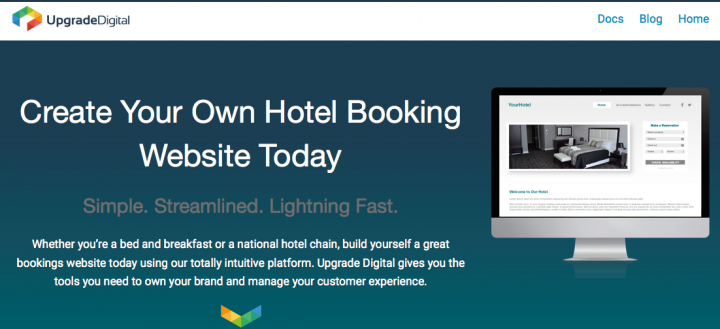Upgrade Digital offers hotels’online presence a five-star upgrade
This article is part of In Conversation with Contemporary Web Startups at the Web Summit
Upgrade Digital helps hotel groups to take advantage of new technology in order to give their online presence an upgrade. It aims to significantly increase their profitabilily by improving their websites and booking engines, and speeding up the links to hotel management systems. Upgrade Digital’s booking API improves performance enormously.
We asked its founder Damien Allison to tell us more about his project and the competitors in his field. We wanted to know his point of view regarding support from the UK, where Upgrade Digital’s headquaters is based, towards new startups.

Damien: Upgrade Digital was founded to allow website builders and media agencies servicing the hospitality market to build websites faster. Our technology enables the creation of amazing booking experiences in a matter of weeks instead of six to nine months. Based on our own booking platform, Upgrade is now developing a solution to allow small hotels to build their own websites using our white label technology.
Helena: Who do you consider to be your biggest competitors?
Damien: Companies like Little Hotelier offer ‘booking engines’ for small hotels and B&Bs, but these types of products take the booker off to a third party URL with inconsistent branding and feel. Our next product aims to give the small hotel owner an integrated solution to all of their website needs.
Helena: My second question relates to the support of your country towards new businesses. Have you evaluated the possibility of gaining some financial support in the future, should you need it?
Damien: For me, it isn’t clear what options are available, but I don’t think there are any clear options that apply to Upgrade Digital. There are some schemes, but I haven’t identified any that would support Upgrade directly.
Helena: What are your main objectives now?
Damien: Our technology has already powered the creation of a number of websites by helping the developers build better sites more easily. Now we want to really show what our technology can do by offering a full website builder product.
Helena: Are you satisfied with your country’s governmental support, and what are your main reasons for this?
Damien: Small businesses and startups now have to manage the administrative burden of pension management on behalf of all of their employees. This is a really good example of how small companies carry an uneven relative cost.

Helena: Are there different ways to support your activity?
Damien: The research and development tax credit system is a good idea, but it doesn’t help technical founders, who are expected to do all of the work themselves. The benefit only helps those non-technical people who are simply paying others to build their company for them. Next year, the government in the UK is also reducing the ability to use dividends to allow startup founders to benefit from their investment of their own invested money.
Helena: Since our blog is focused on recruitment and the world of work in general, my last question relates to your preferences between standard employees, freelance cooperation, or subcontracting. What is your preference at this point in time, and what are the advantages and disadvantages of your choice?
Damien: Upgrade uses a number of freelance workers at the moment but doesn’t have any full-time employees. The cash requirements needed to hire full-time employees is a major hurdle to startup companies. The disadvantage of using freelance workers is that it is harder to create a sense of investment in the product or project.
We would like to thank Damien for his informative answers, and we wish both him and Upgrade Digital a highly successful future.

